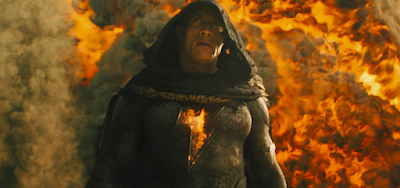Here we are again. Black Adam is another walloping might-makes-right superhero power fantasy. It mistakes noise and movement and non-stop violence for excitement, and assumes loud frantic explanations can pass for story. It has some good visual designs and an atypical setting that engages some novel ideas, but it’s also cloaked in a dour, murderous tone and a pace that’s so quickly cut there’s no room to catch a breath. Yet I’ve also come to appreciate the DC movies for their willingness to go overboard, for their sense of careening out of control with more characters and world-shaking developments than one cluttered feature film could contain. That seems to suit the mythological dimensions of even the lesser efforts in this particular cinematic universe. Unlike Marvel’s tidy decades-long planning and homogenous style, DC has been more often than not a chaos of outsized comic book visuals and nonsense plotting that’s concurrently too thin and overstuffed. This one locates a potentially provocative story of exploitation and imperialism—and the need for the enslaved to rise up and take over their own destinies—and buries it in a hurry-scurry plot that gets nowhere fast amidst breathless exposition and cheesecloth characterizations. It’s unsatisfying in its miss, but not in its swing.
After an endless prologue, it introduces a Justice Society (not to be confused with the Justice League) that apparently works with the Suicide Squad’s leader (Viola Davis) to tackle superpowered problems. In this case: Black Adam. He’s an ancient protector of the fictional Middle Eastern kingdom Kahndaq. He was a slave granted god-like powers by the same wizard (Djimon Hounsou) who gave the kid in Shazam his boost. Adam was asleep for thousands of years. Now awoken in modern day by a freedom-fighting professor (Sarah Shahi), he mostly just wants to bring death and destruction to the imperialist gang that rules what was once his city. They fly around on their sci-fi jet bikes and amass an entirely undifferentiated and vaguely defined army. Adam, played by Dwayne Johnson with a stony edifice and rumbling monosyllabic pomposity, floats like an indestructible block through these armies of Bad Guys, exploding them in surprisingly intense ways given the ostensible bounds of the PG-13. He loves killing those who get in his way. But instead of a simple fight for his country’s freedom, the conflict for most of the movie is that the team of shiny heroes sent in to get him under control would rather he not indiscriminately murder people with his lightning hands and speed and strength and flight. Sure, the enemies are bad, the likes of Hawkman (Aldis Hodge) and Dr. Fate (Pierce Brosnan) tell him. But that doesn’t mean you can just blow them apart.
So Black Adam fights these and other heroes—invincible action figures who slam power into power over and over beyond all reason—until they agree that they instead need to agree to disagree and stop the real bad guys together. The villain who basically sits out the first chunk of the movie suddenly, and literally, turns into a demon from hell, complete with devil horns and a pentagram on his puffed-up CG chest, inaugurating a whole new round of super-punching. It’s all a deadening too-muchness of a repetitive spectacle. The performers are game, and director Jaume Collet-Serra (the B-movie expert in his recent, less effective, A-budget phase) manages to whip up some appealing bombast here and there amidst the otherwise fuzzy, muddy visuals. (I especially liked the fractal planes through which Brosnan travels.) But the swirling frenzy deadens and dominates more than it entertains. I could imagine a version of the movie where it had a slightly sharper take on its politics. Coding the Justice Society as clueless American interventionists is already a step in a clever direction. Explaining their existence even a little bit might’ve been nice. The movie would still need a better shape to its story, though. There’s so much repetition of plot and action beats that one wonder why they wasted their time doing it all so quickly the first time. It may have suitably outsized potential—and a huge, booming orchestral main theme that promises a grander adventure than we get—but it’s just a bludgeoning experience to which you either begrudgingly surrender or give up on entirely.


No comments:
Post a Comment